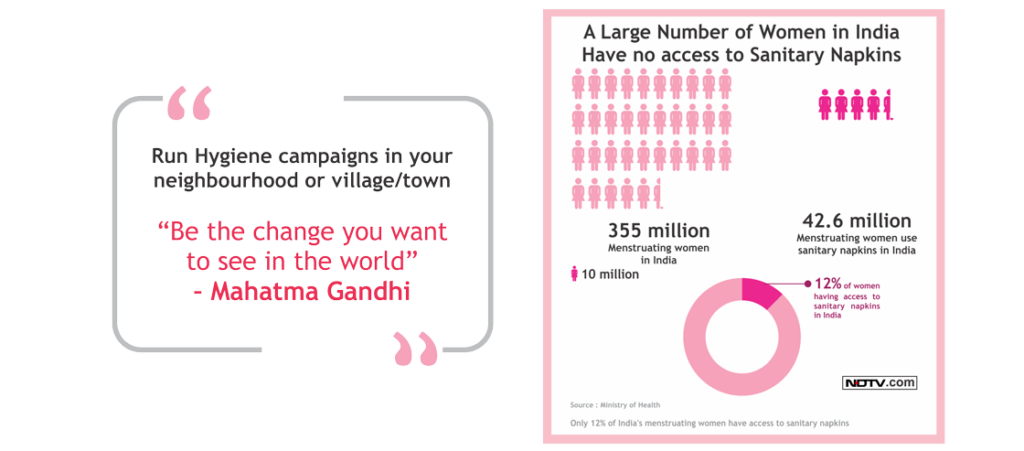SARLA’S STORY
Sarla was barely 12 years old and in 7th grade when she got her first period and that was the end
of her schooling. She was told that during those few days of the month she was impure and could
not enter the kitchen or the temple and had to sit outside the house. She was given an old saree
to use and was given all the reasons to be deprived of routine life.
This unfortunately is the story of millions of girls in India who quit education every year. Apart
from social apathy and cultural taboo towards menstruation, maintaining menstrual hygiene is
difficult for these girls especially in the rural areas due to lack of awareness and not able to
maintain proper hygiene due to lack of clean toilets and running water in schools.

A mother is the first teacher of every child. Every mother can guide her daughter to follow right
hygiene practices provided she is aware of the same. Empowering women is the only way
forward for a brighter future of our world.
It’s time to end all the misconceptions about menstruation and liberate our daughters and sisters
from discrimination.
What is Menstruation?
Menstruation or period is a normal physiological process that occurs every month in every
female. It is the process in a women of discharging blood and other material from the lining of
the uterus at intervals of about one lunar month from puberty to menopause, except during
pregnancy.
Girls usually begin getting their monthly period between ages of 11 to 14 years and continue till
menopause which occurs around 50 years of age. Periods last for about 3 -5 days and girls can
also experience other symptoms such as

- Stomach cramps
- Back pain
- Bloating
- Tenderness in the breasts
- Food cravings
- Mood swings and irritability
- Headache and fatigue
During these 5 days a girl is vulnerable towards life threatening ailments, hence personal
hygiene is of utmost importance. Traditional use of cloth, leaves, sand or ashes needs to be
stopped as these materials contain bacteria which can cause infections. The rough surface of
these materials can also cause skin irritation and discomfort leading to redness and in severe
cases blisters.
Commonly same problems due to poor hygienic conditions
- Urogenital Infections
- Yeast Infection
- Fungal Infection
- Urinary Tract Infection
- Bacterial Infection
Good Hygiene practices during periods
- Use a good sanitary napkin which will not irritate your skin.
- Change the napkin every 6 hours to avoid bacterial growth causing infections.
- Regularly wash your intimate area and keep it clean and dry.
- Do not discard sanitary napkins without wrapping them in paper. Keep the environment clean as well.

Talk to your daughters
Open and honest conversations which educate and inform girls about menstruation is of utmost
importance. Mothers, grandmothers or even paediatric doctors should educate girls as early as 9
– 10 years about how their body is going to change and how to take care of themselves. Make
them understand that it’s a natural phenomenon and nothing to be ashamed of.
Open channels of communication will also encourage your daughters to ask questions and learn
about proper menstrual hygiene.
Make hygiene products easily available
Using the right sanitary pad is of is very important to avoid any health risk. Along with sanitary
pads, use of intimate wash should be encouraged.

Social change occurs when people work at the grass root level. Empower yourself and the
women around by taking action. Do not tolerate, Say. You have the right to be healthy.
- Create Local organisations committed to bringing about change
- Form team and distribute responsibilities
- Associate with NGOs or women’s welfare groups
- Involve the local doctor, it will give more weightage to your cause
- Create a schedule for your discussions and inform people in advance about the meetings
- Promote knowledge with the help of pamphlets, product samples and simple instructions on how to use
- Encourage questions and sharing od experiences
Making your hygiene campaigns successful
- Make use of hygiene kit. It contains a pack of 2 sanitary napkins along with a bottle of 20 ml of intimate wash.
- Let the audience experience the product by touching it.
- Wearing the Key Soul cap and carry pamphlets will give extra credibility to your message.
- Prepare your talk and key points of discussion well in advance. Askit or story presentation will create an emotional connect with the audience which will further enhance enquiries.
- Make a list of attendees for further follow up
Features and Benefits of Key Soul
Products that should be highlighted during your presentation
Sanitary Napkins
- Key soul has created different types of sanitary napkins to support various flow cycles from very high to low.
- Top surface is made of soft cotton which prevents chafing and rashes.
- Key Soul sanitary napkins have anion strips inside the pad liners. These strips absorb the moisture keeping you dry and preventing bacterial growth which can cause infections. They cancel out unpleasant odour giving a feeling of freshness.
- Safe and long – It is a super absorbent pad made in extra-large size making it suitable for day and night. It has superior gel technology which locks fluids faster and gives a dry feel all day long. Its anion strip prevents bacterial growth which can cause infection. It also helps to reduce unpleasant odour giving a feeling of freshness.
- Ultra Thin – Superior gel technology which locks fluids faster and gives a dry feel all day long. Its anion strip prevents bacterial growth which can cause infection. It also helps to reduce unpleasant odour giving a feeling of freshness.
- Regular – It has fluffy pulp for good absorption. Biodegradable.

Intimate wash
- Enriched with Lactic Acid, Lotus Extract
- Maintains Optimum pH balance
- Fight bacterial Infection
- Suitable during menstruation, pregnancy and lactation
- It helps to clean and refreshes your intimate area
Be an associate buyer of RCM, create your own circle and join the movement.











